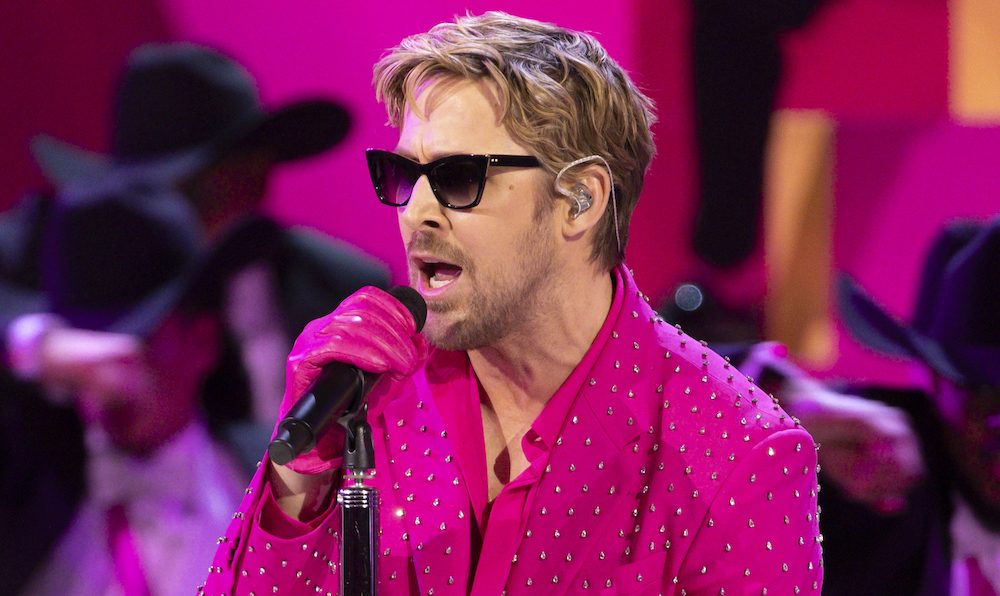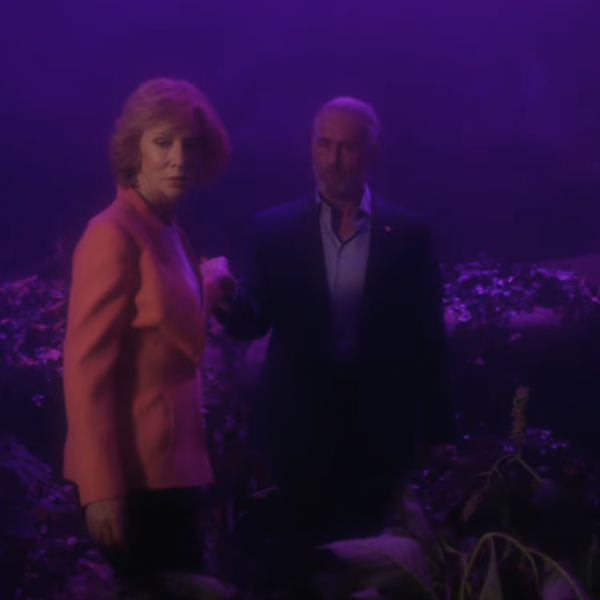Freedom and independence fueled many of this year’s Oscar wins, from “Oppenheimer” and “American Fiction” to “Poor Things” and “Anatomy of a Fall.” Creative choices and thinking outside the box paid off for these Oscar winners. Let Hollywood greenlighters take note that Universal’s gamble on “Oppenheimer” paid off big time, along with Warners’ bet on Margot Robbie and Greta Gerwig’s “Barbie,” which was by no means a guaranteed success.
Accepting the Oscar for Adapted Screenplay for “American Fiction,” backed by T-Street and MRC before it was picked up by MGM/Amazon, TV writer-turned-filmmaker Cord Jefferson said, “I recognize that so many people weren’t given the opportunity I was given. Instead of one $200-million movie, try making 20 $10-million movies.”
Amen to that.
“Oppenheimer,” Christopher Nolan, and Donna Langley
“Oppenheimer” took home its expected seven Oscars, including Nolan’s first wins ever after eight nominations, for Best Picture and Director. The long-overdue British auteur thanked Universal chief Donna Langley for backing the historic bio-epic, which grossed almost $1 billion worldwide. Not everyone would have made that call. Langley bet that the movie would, at minimum, duplicate the performance of “Dunkirk” — $512 million worldwide, three Oscars. “Oppenheimer” delivered and then some, by making history urgent and riveting, accessible and thought-provoking, and, finally, entertaining.
“To the Academy, movies are just a little bit over 100 years old,” Nolan said in his acceptance speech for Best Director. “We don’t know where this incredible journey is going from here. But to know that you think I’m a meaningful part of it means the world to me.”
Accepting the award for Best Actor for playing the theoretical physicist who invented the atomic bomb, Cillian Murphy dedicated his Oscar “to the peacemakers everywhere.”
The Academy recognized the degree of difficulty behind Oppenheimer. Cinematography winner Hoyt van Hoytema, with his first win after two nominations, worked with IMAX to invent new black-and-white film stock. As he accepted his Oscar, van Hoytema said, “Please try shooting with this thing called celluloid. It’s easier and makes things look so much better.”
“Oppenheimer” Best Original Score winner Ludwig Göransson thanked his parents for giving him guitars and a drum kit instead of video games.
At the Soho House after-party in L.A. — an Oscar-night ritual for winners — Langley held court in one corner as the assembled revelers applauded the likes of Nolan, Murphy (the first Irish-born Best Actor winner), and van Hoytema as they joined the celebration, engraved Oscars in hand. Murphy is a contender for the next James Bond. Not a bad idea. Universal now has a leg up among the studios vying to land Nolan’s next project. The world, as they say, is his oyster.
Also celebrating at the Universal party was Da’Vine Joy Randolph, the inevitable Best Supporting Actress winner for Focus Features’ “The Holdovers.” Presenter Lupita Nyong’o’s tribute to Randolph brought the actress to tears. “I wanted to be different,” she said, accepting her Oscar, “and just realized I just needed to be myself. I thank you for seeing me.” She has a stellar career ahead.
“Barbie,” Ryan Gosling, and Billie Eilish

At the start of the evening, host Jimmy Kimmel launched his monologue with $1.4 billion blockbuster “Barbie,” knowing it was his strongest suit with audiences around the world. He pointed out that Barbie and Ken, nominated “Barbie” producer Margot Robbie and Supporting Actor nominee Ryan Gosling, were sitting close to each other, as Gosling reached behind him to grab Robbie’s hand.
Gosling shared one of Oscar night’s funniest moments with “Oppenheimer” Supporting Actress nominee Emily Blunt as they playfully continued the Barbenheimer feud onstage. “You rode our coattails all summer,” he said. “OK, thanks for ‘Kensplaining’ that, Mr. ‘I need to paint my abs on to get nominated,’” she said. The two went on to pay tribute to stunts, ahead of their SXSW “The Fall Guy” premiere; their director, David Leitch, edited the Oscar sizzle reel.
And Gosling’s night didn’t end there: The hardest working man in show business then delivered Oscar night’s joyful show-stopping production number, “I’m Just Ken,” inspired by Marilyn Monroe’s “Diamonds Are a Girl’s Best Friend.” And then “Barbie” went on to win Best Song for “What Was I Made For,” performed by Finneas O’Connell and his sister Billie Eilish, the youngest people to have won two Oscars. That was a lot of Oscar screen time for one movie.
Jimmy Kimmel and Molly McNearney

The week-night host of “Jimmy Kimmel Live!” returned to host the Oscars for the fourth time and knocked it out of the park, with support from his wife Molly McNearney, who runs his writers’ room and was one of three Oscar executive producers. Kimmel told me at the Governors Ball that he noticed that several other awards shows had not addressed the traumatic writers and actors strikes; so he took it on, adding support for the IATSE, who are now in negotiations with the studios and streamers, bringing the behind-the-scenes personnel onto the Oscar stage.
McNearney didn’t want Kimmel to read Trump’s scathing Truth Social review of the show, but Kimmel had time to respond with, “Aren’t you past your jail time?” The show was aiming for three and a half hours ahead of “Abbott Elementary” airing on ABC — and made it with 22 seconds to spare.
As for the odd Al Pacino Best Picture announcement, the Oscar producers weren’t planning to reprise the top 10 contenders, figuring they had no time. McNearney admitted at the Governors Ball that maybe they should have.
“Poor Things” and Searchlight

Things started to look up for Emma Stone’s second Oscar win for Best Actress when Yorgos Lanthimos’ “Poor Things” took away Makeup and Hairstyling from “Maestro,” and Costumes and Production Design from “Barbie.” Finally, the movie, which scored $100 million at the global box office, won four of the same Oscars it won at the BAFTAs. (“Oppenheimer”‘s seven Oscar wins also matched its BAFTAs.) It’s a reminder of the power of the international voters, who make up more than 20 percent of the Academy membership. “It’s about a team who came together to make something better than the sum of its parts,” said a visibly shocked Stone upon winning.
Searchlight’s two chiefs, aka the Greens —David Greenbaum, who is taking the reins at Disney Live Action and Twentieth Century, and Matthew Greenfield, who will run the specialty division solo — were all smiles as they lined up for the Governors Ball. They won five, actually, as they also backed documentary short winner “The Last Repair Shop.”
Lily Gladstone
The first Native American woman to be nominated for Best Actress has a solid career ahead. Placing her in the Best Actress category for “Killers of the Flower Moon” elevated her stature and telegraphed that she was crucial to the movie. Apple mounted a solid campaign, but she couldn’t compete with Stone’s bravura transformations as Bella Baxter. No one could. “Killers of the Flower Moon” launched at Cannes and peaked early; Leonardo DiCaprio and Scorsese and his co-writer Eric Roth failed to land nominations. When directing nominee Martin Scorsese realized that, for the third time at the Oscars, he was 0 for 10, after “Gangs of New York” and “The Irishman,” his face sagged.
“Anatomy of a Fall” and Neon
Neon chief Tom Quinn loved playing the Oscar game, even if it meant keeping people guessing about “Anatomy of a Fall’s” blue-eyed canine star Messi attending the Oscars. (He got a wicked close-up.) “Anything to get people to see the movie,” Quinn said in line for the Governors Ball, showing me on his iPhone that “Anatomy of a Fall” is in the top five on iTunes. Onstage accepting the inevitable win for Original Screenplay, director Justine Triet, who started her awards run by winning the Palme d’Or at Cannes, said the Oscar “will help me through my mid-life crisis.” Her partner and co-writer Arthur Harari reminded in their speech that “freedom and independence” fueled this original movie. Later, as the duo waited for an elevator to go to the Neon party, Triet was barefoot, holding her heels. It was a long day.
“The Zone of Interest” and A24

For the first time, three dominantly foreign-language films were nominated for Best Picture: “Anatomy of a Fall,” “Past Lives,” and “The Zone of Interest.” And five non-English language winners marked an Oscar record; they won six awards collectively. Jonathan Glazer’s Holocaust movie, the Grand Prix winner at Cannes, was expected to win Best International Feature Film. “All our choices were made to reflect and confront us in the present,” said Glazer. “Not to say, ‘Look what they did then’; rather, ‘what we do now.’ Our film shows where dehumanization leads at its worst.”
His speech, denouncing how the Holocaust is being “hijacked by an occupation,” in reference to the Israel-Gaza war, has garnered controversy. Glazer was notably the only winner to speak out on the conflict onstage.
The second “The Zone of Interest” win was unexpected: It competed for Best Sound with the mighty “Oppenheimer,” and won. It joins two sophisticated sound-heavy indie films that took this category: “The Sound of Metal” and “Whiplash.” “We need to thank the Academy for listening to our film,” said sound engineer Tarn Willers, who shared the award with sound mixer Johnnie Burn.
Japan’s “Godzilla Minus One” and “The Boy and the Heron”
It was a great night for Japan. Marking the first win for Japan in the VFX category was “Godzilla Minus One,” a movie that cost less than $15 million. Oscar voters were impressed by that ingenuity. “This is proof that everyone has a chance,” said the film’s director and VFX supervisor, Takashi Yamazaki.
Meanwhile, master animator Hayao Miyazaki won Best Animated Feature once before, for “Spirited Away.” This win was about celebrating his continuing artistry and return from retirement. And it’s tough for sequels to win at the Oscars, even if “Spider-Man: Across the Spider-Verse” outperformed the original in every way.
Netflix Wins One Oscar
Yet again, the canny Netflix awards team landed a remarkable panoply of Oscar nominations (19), which they wisely celebrated the night before the Oscars. While multi-tasker Bradley Cooper’s Leonard Bernstein biopic “Maestro” earned seven nominations, he wound up with nothing. Netflix’s only win was for no-show Wes Anderson, who starts his next movie on Tuesday in Europe. The live-action short “The Wonderful Story of Henry Sugar,” starring Benedict Cumberbatch, marks his first Oscar win.
Ukraine Wins Its First Oscar
Devastating war documentary “20 Days at Mariupol” took the win as expected, marking Ukraine’s first Oscar. “You are some of the most talented people in the world,” said Mstyslav Chernov, who put himself in grave danger shooting the film. “We can make sure the truth can prevail. Cinema forms memories, and memories form history.”



